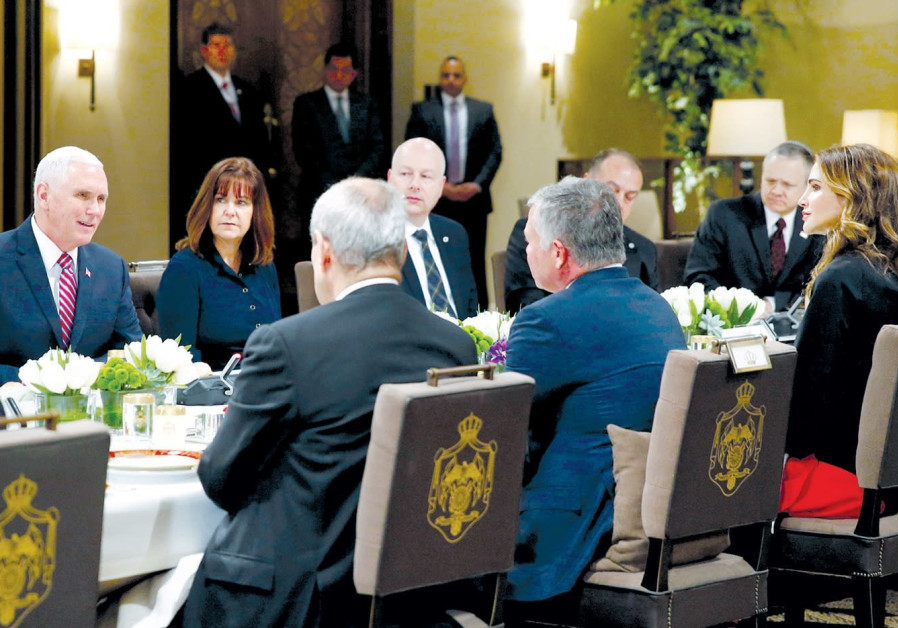Jordan has a majority population of Palestinians. This puts King Abdullah in a difficult spot.

US Vice President Mike Pence’s Middle East trip stands out as a positive milestone for the Israeli Right. But for Jordan it looks entirely different.
This is because it has reinforced the sense of the demise of the two-state solution to the Israeli-Palestinian conflict, a core Jordanian interest, perhaps even a matter of survival.
Visiting Amman for talks with King Abdullah, or “Abdoolah,” as Pence pronounced his name, and during his Knesset speech, the vice president reiterated that Israel would have a de facto veto over the emergence of a Palestinian state if it so desires. “President [Donald] Trump has confirmed that if both sides agree, the United States will support a two-state solution,” he told the Knesset.
Pence also followed up on Trump’s recognition of Jerusalem as Israel’s capital by setting a date for the opening of the US Embassy in Jerusalem by the end of 2019.
The Jerusalem recognition and the dropping of previous administrations support for a two-state solution completely disregard Jordan’s concerns and needs, and put King Abdullah on the hot seat. But given Jordanian financial dependence on Washington – approximately a billion dollars a year in US aid is disbursed – there is nothing the king can do in response.
With a Palestinian majority population, the king needs to show he is fully backing the Palestinian quest for an end to Israeli military rule and the establishment of an independent Palestinian state with east Jerusalem as its capital. As Brandon Friedman, a Middle East specialist at Tel Aviv University’s Dayan Center noted, the king realizes he needs to win over those Jordanians of Palestinian origin and not rely entirely on the traditional East Bank elite that built the Jordanian state.
“This makes him much more sensitive to the Palestinian issue and to unilateral American steps,” he said, adding that Jordanian decision-makers “recognize that the Palestinian issue is almost interlocking with the future stability and success of the Hashemite Kingdom.”
In the view of Mkhaimar Abusada, a political scientist at Al-Azhar University in Gaza, “the king must follow a delicate line of not provoking the US in a way that would jeopardize funding while not being seen as surrendering positions on the Palestinian issue to the US and Israel.”
Abusada said the collapse of hopes for peace based on the two-state idea raises the prospect of instability in the West Bank, which could spread eastward, and the real possibility that in a future conflict, Israel will push West Bank Palestinians to the East Bank.
With Iraq, Syria, the West Bank and Israel as neighbors, and the threat posed by Salafi extremists, “Jordan isn’t living in golden times to deal with upheaval,” Abusada says.
To make matters worse, the US cutting of funding for the UN agency for Palestinian refugees threatens to fuel instability by impacting on the basic education and health services of Palestinian-Jordanians living in camps. But, as Pence and Trump know all too well, there is nothing Jordan can do other than grimace and hope for the best.
Pence alluded to the American sense that Jordan will have to acquiesce to US policies when he told reporters in Amman that he and the king had “agreed to disagree” on the Jerusalem recognition.
Abdullah was careful to thank the US for its assistance to Jordan and praised Pence for the warmth of relations. But Hassan Barari, an academic and columnist for the Jordan Times expressed the genuine worry of Jordan in an article Monday. The US position, he wrote, “undercuts the argument that the US can be an honest broker. Apparently Mike Pence does not even care about that. He, an evangelical Christian, was the driving force behind Trump’s decision recognizing Jerusalem as Israel’s capital.
“At the heart of the recent developments is an American desire to undermine the prospects of a two-state solution,” Barari wrote.
“There is little doubt that the pendulum is now swinging in favor of Israel’s right-wing vision of the form and contents of the comprehensive ‘deal’ that will solve once and for all the Palestinian problem. But the bottom line is there may be no two-state solution, but on the other hand there will be no peace either.”
As reported by The Jerusalem Post
